 We are now deep into Autumn (at the time of this writing) where I live. Leaves have fallen, and they need to be raked up before the HOAs start deploying their secret police. Fun times. But what if you had to complete that chore on the Moon? Raking moon leaves with no gravity. Now there’s a game idea. Sadly, Moonrakers is decidedly NOT about raking leaves on the moon. Moonrakers is actually about a band of space mercenaries jockeying to become the leader of their misfit group.
We are now deep into Autumn (at the time of this writing) where I live. Leaves have fallen, and they need to be raked up before the HOAs start deploying their secret police. Fun times. But what if you had to complete that chore on the Moon? Raking moon leaves with no gravity. Now there’s a game idea. Sadly, Moonrakers is decidedly NOT about raking leaves on the moon. Moonrakers is actually about a band of space mercenaries jockeying to become the leader of their misfit group.
Moonrakers is a deckbuilding and negotiation game for 1 to 5 players which takes about one to two hours to play, depending on player count.
Gameplay Overview:
Moonrakers is a race to 10 points. Players gain points by completing contracts and objectives. Each player starts with the same deck of 10 basic action cards. Most notably, a couple of Reactors to get more actions, a couple of Thrusters to draw more cards, and some Shields to block damage from hazard dice.
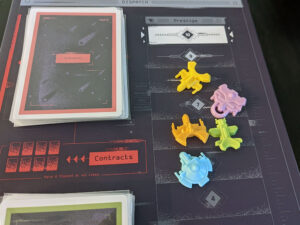
All players will have a hand of at least five cards drawn at any given time, which can be used during a contract attempt. During their turn, the active player may choose a contract from the market to complete or stay at base and get a few small rewards. All contracts include the following: symbols that must be played to succeed, a number of hazard dice that must be rolled, and the rewards that get split amongst the players who successfully complete the contract. The active player can then ask any player(s) they want to assist them. After negotiations are complete, assuming the active player got the assistance they wanted, the contract will be attempted.
During a contract attempt, one player plays through all of their actions before moving on to the next player. Each player starts with one action, which is equal to one card play. A player’s goal is to play through their hand in the most efficient manner to, ideally, contribute symbols needed to complete the contract and block any hazards they personally rolled. Each unblocked hazard subtracts one prestige (victory point) from the player who rolled it.
Once a contract is completed, the players divide the bounty per the terms negotiated beforehand. If the contract fails, no rewards are gained, but unblocked hazards still apply. Either way, the active player ends their turn by purchasing either crew members or ship parts if they can and choose to. Crew members are like beefed up action cards that go into a player’s deck, usually supplying both symbols and special abilities. Ship parts slot into a player’s board and provide ongoing passive abilities and often add basic action cards to a player’s decks. The active player and any other players who attempted the contract discard any remaining cards in their hand and draw five new cards before play passes to the next player.
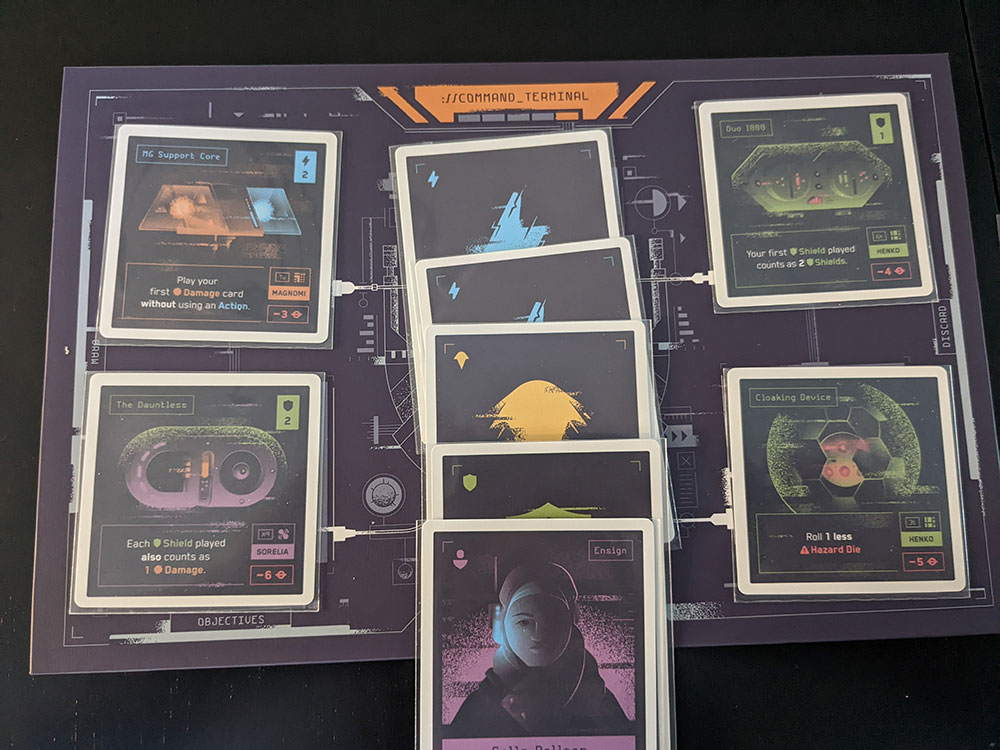
Game Experience:
I’ve always been a big fan of these deck builders that are more than just deckbuilding. My favorite iteration of this concept is Baseball Highlights 2045 (Fitzgerald, 2015). There’s a clever hand management aspect instead of just playing every card at once every turn. Moonrakers has that same added element. The mini game involved in completing a contract adds some serious implications for the order that you play your cards. You see, you need to have enough actions to play enough cards to meet the contract requirements. You only start with one action, and you’ll need more.
The deckbuilding strategy here is strong. You can purchase crew cards to add directly to your deck. They are all pretty powerful and exciting to play, often providing symbols to complete contract requirements plus special abilities like lowering contract requirements, drawing several cards, adding multiple more actions, negating hazards, trashing cards, and so much more. What really puts this game’s deckbuilding over the top is how quickly you cycle through cards. When you purchase a new crew member, you’ll be seeing it soon and then often thereafter. You can even join in on a contract just to discard your hand and draw five new cards. Smart.
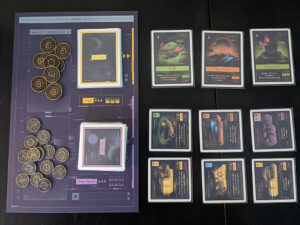
To supplement the deck you’re building, ship parts can be purchased, providing ongoing special abilities and some extra basic action cards for your deck. This is a great way to fine-tune your strategy. If your deck is light on Reactors, why not start every contract by drawing an extra card? Can’t block hazards very well, there’s a ship part to allow you to roll one less hazard die per contract attempt. This is also a great bartering tool that can make you a great ally to have. Of course, you won’t see every ship part in every game, but there are an abundance of great cards to choose from. I’ve never felt like the market was lacking something I wanted. There aren’t any boring crew or ship part cards in the game. That’s an impressive feat. If I had to nitpick, I’ll just say I want to see crew card variety added since you’ll see most of those every game.
The game has a nice arc. In the beginning, players are either going it alone and making slow progress or teaming up and splitting some big bounties. Early on, credits (currency) seem to be a hotter commodity than prestige, but that changes once folks have 4, 5, and 6 points. It’s that shift you see in Dominion and other classic engine builders. When do you stop building the engine and switch the focus on running the engine for points? That is handled well here as you can find your own personal balance between the two and use that to negotiate.
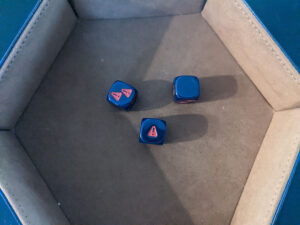
Speaking of negotiations, you really have to enjoy that process to enjoy this game. It’s baked into the core of the experience here, not just thrown in as an afterthought. You will often get into the nitty gritty of it. I’ll take one more hazard die if you give me a point. Okay, but then one less coin for you. Ehh… I’m going to seek a different ally or maybe attempt another contract altogether. Of course, you’ll have some quick and easy deals, but players will get more picky and greedy as the game goes on, and I really enjoy that dynamic. For me, it’s the right level of player interaction. Few silent moments and you’re always invested in your opponents’ turns. There are also quite a few things to negotiate with on a contract. You have credits, prestige points, random card draws, and rolling hazard dice. The tradeoff between rewards and the possibility of losing victory points is so juicy. There’s even the possibility of a well-timed betrayal, though it is very rarely in a player’s interest to do so.
The end of the game can be anti-climactic. If someone only needs two to three prestige points, they’ll likely be able to pull off a contract on their own and win it that way. While you can discard contracts in an attempt to get rid of the easier ones, there are always 8 available. That generally means that what a player needs in terms of difficulty and rewards will always be available. While I don’t normally house rule any games, I have been considering cutting the contract market down to 6 to add some more tension and entice players to discard contracts more frequently as an added layer of strategy. On the flip side, I actually really like the fact that seemingly impossible contracts can be pulled off by one or two players with clever comboing.
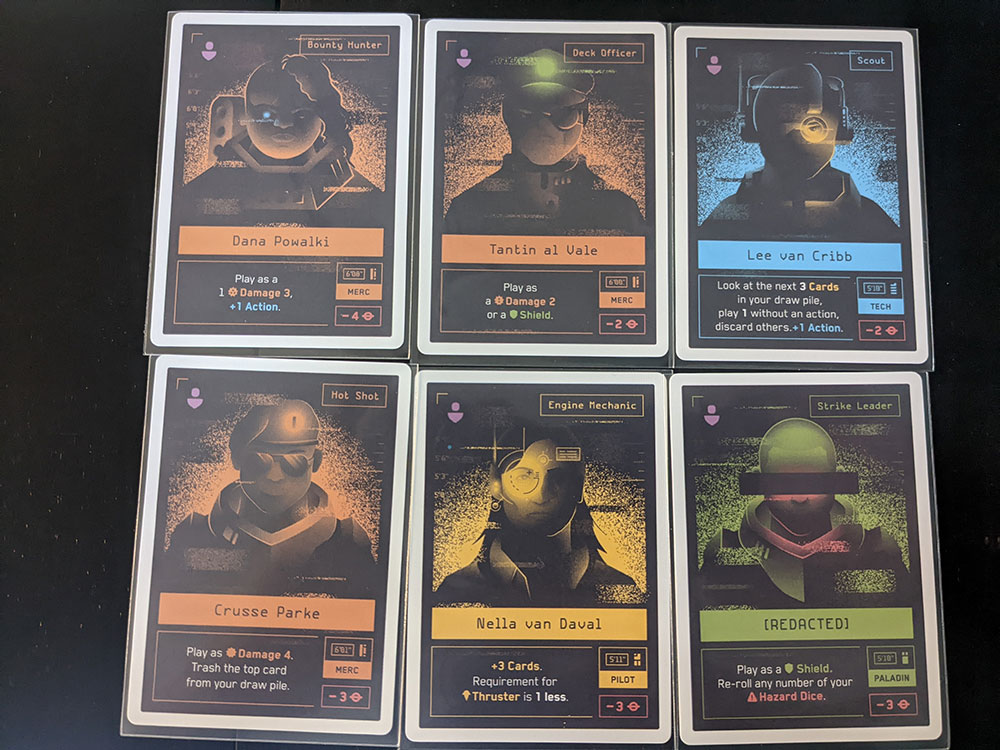
Final Thoughts:
I think I’ve gone over the BGQ word count limit (Editor’s note: he did), but that’s because there’s so much worthy of discussion in Moonrakers. Anyway, I’ll keep the final thoughts short. This is deckbuilding done right. It feels fresh, and there are added layers of negotiation and hand-management. It looks like most of my complaints are being addressed with upcoming expansions, which I cannot wait for. If the combo of deckbuilding and negotiation appeals to you on paper, go try this game. It lives up to what it promises, delivering interesting decisions and player interaction in spades.
Final Score: 4.5 Stars – Deckbuilding done flawlessly with tense negotiations throughout.
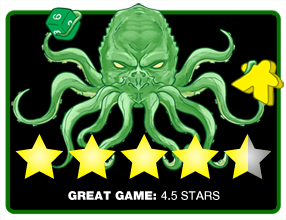 Hits:
Hits:
• Interesting hand management system on top of well-executed deckbuilding
• Negotiation system is flexible and intriguing, providing lots of interaction
• Exciting combos and huge plays abound
• Quick teach and playtime
Misses:
• The winner can be an inevitability for the last round or two
• Needs more variety in crew cards
• Potentially too many contracts available at a time




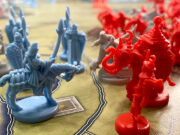

















Moonrakers is a fantastic game for groups that like negotiation. Your negative point about the winner being an inevitability in the last round doesn’t really make sense to me. Isn’t that the case in all round based games? The expansions do add more crew, more interesting missions, and variable powers. We play the TTS mod often and I can’t wait for the all-in kickstarter titan pledge to ship!